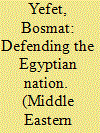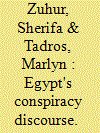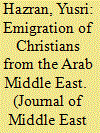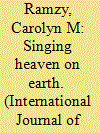| Srl | Item |
| 1 |
ID:
164909


|
|
|
|
|
| Summary/Abstract |
This article discusses the Muslim discourse concerning the Coptic Christian minority since the 2000s in Egypt. Emphasizing the effects of the January 2011 uprising, the paper analyzes the role of nationalism and the national unity discourse in suppressing the debate regarding discrimination against the Copts. Despite the fissures that were created in the discourse, which rejects any reference to discrimination against the Copts, the Coptic issue remains trapped among the contested interpretations of national unity. All narratives of national unity and Egyptian essence, whether the official one pursued by the regime or the one promoted by pro-democracy activists, require the Copts to suppress their demand for rights for the sake of national unity. Adherence to the national unity discourse by all forces precludes the possibility of developing a form of nationalism or a national culture which embodies pluralism of identities and cultures and reinforces the role of nationalism as a tool for stifling pluralism and democracy for all Egyptians, whether Muslim majority or minorities.
|
|
|
|
|
|
|
|
|
|
|
|
|
|
|
|
| 2 |
ID:
142179


|
|
|
|
|
| Summary/Abstract |
Edward Said's concept of orientalism was developed from his perception of the role of scholarship in the West's exploitation of the East for the purpose of conquest and the maintenance of political power. It was not simply a construct of Eastern inferiority versus Western superiority. Hassan Hanafi, chair of philosophy at Cairo University, first encouraged a “science of occidentalism” to counter orientalist studies.1 However, as Syrian philosopher Sadiq al-Azm has suggested, one must heed Said's warning to the subjects and victims of orientalism against the dangers of applying the readily available structures, styles and ontological biases of orientalism upon themselves and others.2 That would result in orientalism in reverse, or the internalizing of orientalist political intentions.
|
|
|
|
|
|
|
|
|
|
|
|
|
|
|
|
| 3 |
ID:
168851


|
|
|
|
|
| Summary/Abstract |
Since the late 1950s, Christians’ emigration from the Arab Middle East has been a basic phenomenon affecting the political and social landscape of the region as well as a fundamental dynamic behind the depression of its Christian demography. This article shows that the intensive departure has been the result of structural and historical factors related to the performance of the modern Arab nation-states in the post-colonial era. Instead of the generalized and simplistic explanations that are often advanced that link the Christians’ emigration to Islamic revivals, the main dynamic of this out migration instead can be found in the policies of the modern Arab state and the outbreak of communal and regional conflicts.
|
|
|
|
|
|
|
|
|
|
|
|
|
|
|
|
| 4 |
ID:
154655


|
|
|
|
|
| Summary/Abstract |
This article explores the performative politics of devotional soundscapes at Coptic Christian mūlid festivals. Echoing the state's reformist efforts in the 1990s to transform Muslim saint festivals into utilitarian spaces and their goers into “modern” Egyptian citizens, today the Coptic Church works to refashion these popular festivals from places of debauchery into morally productive spaces. Aided by affluent Cairene-based volunteers, church choirs travel from Cairo's poshest neighborhoods to these festivals to actively sing, disseminate, and teach popular religious songs (taratīl) in an effort to develop poorer Christian pilgrims into modern, pious, and more audible “citizens of heaven.” Through the analysis of one church choir's taratīl ministry at the mūlid, I illustrate how middle-class spiritual volunteers disrupt and, at times, reinscribe the Coptic Church's disciplinary efforts on the festival's poorer pilgrims, particularly as they look to modernize popular festivity into grounds of Christian ethical transformation.
|
|
|
|
|
|
|
|
|
|
|
|
|
|
|
|